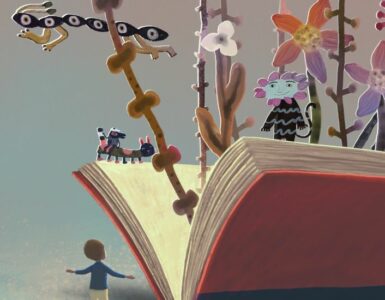Dr Holly Joseph and Dr Nicola Wilson speak to CONNECTED about how reading can be used to alleviate homeschooling worries, and help individuals keep calm during the current crisis.
Book clubs and the Blitz
With many of us now confined to our homes, options for what to do during our free leisure time has become restricted. However, Associate Professor, Nicola Wilson from the Department of English Literature, suggests that reading may be the answer to our worries as she explores how Britons used reading to get them through the Second World War. With reports that book sales are soaring, what can the reading patterns of an earlier generation tell us about getting through a crisis and staying at home?
Selling tales
The restrictions at the beginning of the Second World War affected all aspects of day-to-day life, but it was the blackout that topped most people’s list of grievances – above food and fuel shortages, the evacuation, and a lack of news and public services. Households were reprimanded and fined for showing the slightest bit of light through their windows and walking around, even along familiar streets late at night became treacherous. As Dr Wilson explains, this need for confinement led book sales to soar:
“With the widespread limitations to free movement, the book trade was quick off the mark. Books were promoted by libraries and book clubs as the very thing to fight boredom and fill blacked-out evenings at home, or in shelters with pleasure and forgetfulness.”
The Book Society
The Book Society – run by a selection committee of literary celebrities from JB Priestley to Cecil Day-Lewis – was setup in 1929 and it shipped out ‘carefully’ selected books to thousands of readers each month. Dr Wilson explains the Society’s crucial role:
“This Book Society guided readers diligently through the confusion of appeasement and the run-up to the Second World War, with a marked increase in recommendations of political non-fiction examining contemporary geo-politics.
“When Britain finally declared war against Germany in September 1939, the Book Society promoted reading as a way to stay calm and positive.”
The Book Society judges advised members that when they became weary of news, people “will turn to books as the best comfort” as had happened in the First World War with an increase in reading and library membership.
“Publishers and booksellers faced huge challenges during the Second World War, including paper shortages, problems in distribution, a vanishing workforce and bomb damage to offices and warehouses. But there were more readers – and from a wider social class – at the end of it. Demand consistently outstripped supply as consumer expenditure on books more than doubled between 1938 and 1945.”
Connecting with the past
Throughout the Second World War, the Book Society varied its lists between books that offered some insight on the strangeness of contemporary life and works of fiction – especially historical fiction – that took readers’ minds off it. Titles in the first group included comic novels by the likes of Evelyn Waugh, whilst more topical non-fiction became a priority as the devastation of the Blitz kicked in with Into Battle: Winston Churchill’s War Speeches becoming a popular choice. Classic books also became a fail-safe, with the Book Society reissuing new editions of Jane Austen’s Pride and Prejudice and Leo Tolstoy’s Anna Karenina. These were books that people could sit down with even through an air raid.
Looking back on these reading patterns, and with a current reported rise in sales of classic fiction, it is clear that Britons have turned to reading once again as a source of pleasure and fulfilment during the COVID-19 crisis. As Dr Wilson highlights, there are definitely some continuities from Britain during the Second World War to today.
“It is sobering to reflect on how an imaginative connection with the past has long helped readers find relief from the madness of the present.”
Reading at home
It’s not only Dr Wilson who has been promoting the benefits of reading in these difficult times, but Dr Joseph from the Institute of Education, has also been reminding parents of the joys of reading with young children and how it supports formal learning.
“Many parents are struggling at the moment – juggling work, domestic responsibilities and educating their children. With so much information available about structuring the day, staying positive and making learning fun, have we all forgotten about something much simpler but equally worthwhile?
“Research shows that reading to your child, or once your child is older, reading independently, is one of the most valuable activities we can do at home.
“Reading engaging story books with young children has been shown to improve vocabulary knowledge and is associated with better reading comprehension once children start school.”
Older children who read for pleasure are also more likely to do well at school, and the relationship between reading experience and reading skill is reciprocal such that better readers read more, thus improving their vocabulary and becoming even better readers. Dr Joseph explains why reading is so vital:
“One reason that reading is so important is that the language in books is not the same as in spoken language: books tend to contain rarer words and more complex grammatical structures so reading exposes children [and adults] to language they are otherwise unlikely to encounter.
“Recent University of Reading research shows that for adolescents, reading literary fiction [rather than non-fiction and other genres] provides the best chance of encountering the kind of vocabulary that students are likely to encounter in the GCSE English Language exam. Children who speak English as an additional language have also been shown to benefit hugely from reading for pleasure, and this is the case in both their first language and in English.”
Of course, not all children are keen to read, and those who find it challenging are likely to be less motivated. One alternative is audiobooks. This may not feel like reading, but all the benefits of being exposed to new vocabulary, complex grammar, new knowledge and story structure are still present.
Grab a book
As Dr Wilson recommends:
“Rest assured that an hour’s reading every day will improve your child’s vocabulary, increase their knowledge about the world and set them up to succeed in their education and beyond.”
And don’t forget that reading isn’t only a benefit for your children. So if you’re looking for a bit of company and relaxation after a long day of homeschooling or working from home, why not grab that book you’ve been meaning to read for a while and get started?
Find out more about Dr Wilson’s and Dr Joseph’s research.
Dr Wilson’s article was first published in The Conversation on 9 April 2020.






